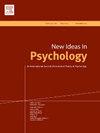Technopsychology: A new wave of psychological inquiry
IF 2.9
3区 心理学
Q2 PSYCHOLOGY, EXPERIMENTAL
引用次数: 0
Abstract
Technology plays an important role in human existence, yet its theoretical significance has seldom been explored in psychology. This article introduces technopsychology, a new framework for exploring human-technology relationships. In doing so, it traces three waves in the history of psychology: First, cognitive psychology, which treats technologies as distant objects that we ‘look-at’. Second, discursive psychology, which views technologies as passive symbols that we ‘talk-about’. Finally, the article presents technopsychology, which treats technologies as active mediators that we ‘interact-with’. Drawing on insights from science and technology studies (STS), the article goes on to present three tenets of technopsychology: 1) a rehabilitation of human embodiment, 2) an understanding that human bodies are materially situated, and 3) the recognition that human agency is technologically mediated. By highlighting the active role of material artifacts, technopsychology seeks to challenge earlier waves of inquiry and expand the study of psychology. Ultimately, technopsychology invites psychology to reimagine its core phenomena—such as attention, memory, racism, and sexism—not as occurring apart from technology, but as enacted through our everyday entanglements with it.
技术心理学:心理学研究的新浪潮
技术在人类生存中扮演着重要的角色,但心理学对其理论意义的探讨却很少。本文介绍了技术心理学,这是一种探索人与技术关系的新框架。在此过程中,它追溯了心理学历史上的三个浪潮:首先是认知心理学,它将技术视为我们“注视”的遥远物体。第二,话语心理学,将技术视为我们“谈论”的被动符号。最后,本文介绍了技术心理学,它将技术视为我们“互动”的主动中介。根据科学和技术研究(STS)的见解,文章接着提出了技术心理学的三个原则:1)人类化身的康复,2)对人体物质位置的理解,以及3)认识到人类能动性是技术中介的。通过强调物质人工制品的积极作用,技术心理学试图挑战早期的调查浪潮并扩展心理学的研究。最终,技术心理学邀请心理学重新想象它的核心现象,如注意力、记忆、种族主义和性别主义,这些现象不是在技术之外发生的,而是通过我们与技术的日常纠缠而发生的。
本文章由计算机程序翻译,如有差异,请以英文原文为准。
求助全文
约1分钟内获得全文
求助全文
来源期刊

New Ideas in Psychology
Multiple-
CiteScore
4.80
自引率
3.80%
发文量
37
期刊介绍:
New Ideas in Psychology is a journal for theoretical psychology in its broadest sense. We are looking for new and seminal ideas, from within Psychology and from other fields that have something to bring to Psychology. We welcome presentations and criticisms of theory, of background metaphysics, and of fundamental issues of method, both empirical and conceptual. We put special emphasis on the need for informed discussion of psychological theories to be interdisciplinary. Empirical papers are accepted at New Ideas in Psychology, but only as long as they focus on conceptual issues and are theoretically creative. We are also open to comments or debate, interviews, and book reviews.
 求助内容:
求助内容: 应助结果提醒方式:
应助结果提醒方式:


